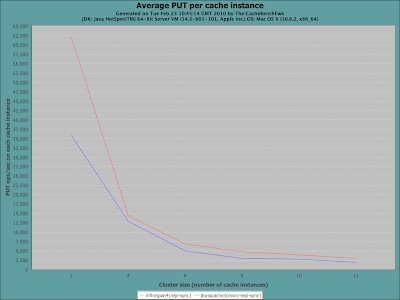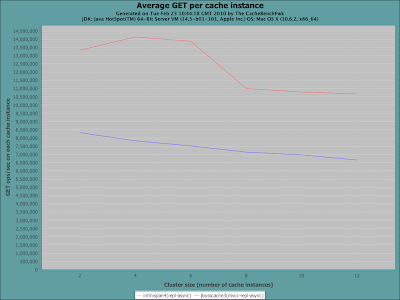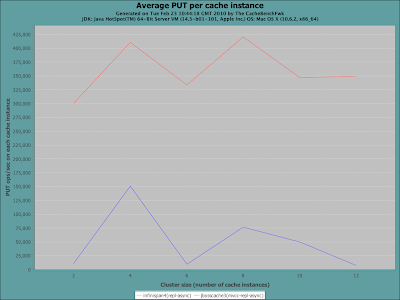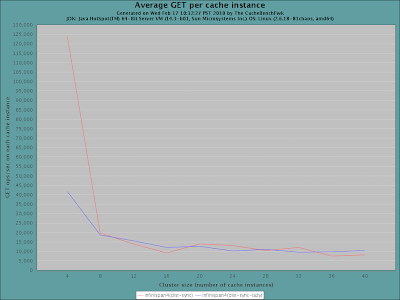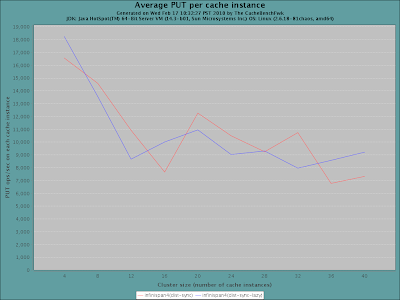Wednesday, 26 June 2013
Infinispan 5.3.0.Final is out!
Dear Infinispan community,
We’re proud to announce the final release of Infinispan 5.3.0 "http://www.masterofmalt.com/beer/brewdog-tactical-nuclear-penguin-375cl-beer/[Tactical Nuclear Penguin]". Besides increased stability (130+ bug fixes) this release also brings some highly demanded features:
-
Total Order transaction protocol developed within the scope of the CloudTM project yielding significant performance improvements under concurrent access
-
Support for JSR-107 (Java Caching API) implementation
-
A new implementation of the Lucene Directory for Infinispan based on Lucene 4
-
A new packaging for the Infinispan server modules, based on the JBoss AS
-
Interoperability between Hot Rod, Memcached, REST and embedded mode
-
Storing arrays in Infinispan as keys and values
-
Several new cache stores: a mongoDB cache store (courtesy of Guillaume Scheibel), a JPA based cache store and a LevelDB cache store (courtesy of Ray Tsang)
For a complete list of features included in this release refer to the release notes.
Visit our downloads section to find the latest release and if you have any questions please check our forums, our mailing lists or ping us directly on IRC.
Time to move forward now: Infinispan 6.0 will bring some significant improvements to the Inifinispan ecosystem and also a shift in licence to Apache Software Licence
Stay tuned!
Cheers,
Mircea
Tags: release final
Friday, 08 February 2013
Infinispan 5.2.1.Final is out!
This release fixes two critical memory-leaks:
A big thanks to Erik Salter for spotting and patching the above issues!
For a complete list of things included please refer to the release notes. Remember to visit our downloads section to find the latest release and if you have any questions please check our forums, our mailing lists or ping us directly on IRC.
Cheers,
Mircea
Tags: release final
Thursday, 31 January 2013
Infinispan 5.2.0 Final has landed!
Dear Infinispan community,
I am pleased to announce the much awaited final release of Infinispan 5.2.0. With more than 100 new features and enhancements and 150 bug fixes this the most stable Infinispan version to date. Highlights:
-
The non-blocking state transfer which is a much more efficient and flexible implementation of the functionality that allows Infinispan to serve requests during nodes joining/leaving.
-
The cross-site replication functionality which allows backing up data between geographically distributed clusters in order to protect against catastrophic failures
-
Rolling upgrades of the hotrod clusters (zero downtime for upgrades)
-
A handful of fixes and improvements for the Map/Reduce framework
This release has spread over a period of 8 months, with a total of 4 Alpha, 6 Beta and 3 CR releases: a sustained effort from the core development team, QA team and our growing community - a BIG thanks to everybody involved!
Remember to visit our downloads section to find the latest release and if you have any questions please check our forums, our mailing lists or ping us directly on IRC.
Cheers,
Mircea
Tags: release final
Thursday, 26 April 2012
Infinispan 5.1.4.FINAL is out now!
Infinispan 5.1.4.FINAL is out now fixing a bunch of issues as well as enhancing performance of Infinispan’s Memcached and REST servers, plus it now exposes a couple of new JMX attributes such as cache view (RpcManager.CommittedViewAsString & RpcManager.PendingViewAsString) and cluster name.
Please note that we’ve changed the default value of worker threads for Infinispan servers to be twice the number of processors instead of 20 times the number of processors in order to be more efficient out of the box. The number of worker threads is of course configurable, so you can always modify it according to your use case.
Full details of what has been fixed can be found here, and if you have feedback, please visit our forums. Finally, as always, you can download the release from here.
Cheers, Galder
Tags: release final
Wednesday, 28 March 2012
Infinispan 5.1.3.FINAL is here!
Infinispan 5.1.3.FINAL is out now after having received very positive feedback on 5.1.3.CR1 and fixing some other issues on top of that, such as the file cache store leaving files open, improving standalone Infinispan Memcached implementation performance, and including Infinispan CDI extension jars in our distribution.
"Release early, release often", that’s out motto, so we’ll carry on taking feedback onboard and releasing new Infinispan versions where we improve on what we’ve done in the past apart from coming out with new goodies.
Thanks to everyone, both users who have been getting in touch to provide their feedback and developers who have been quickly reacting to users fixing issues and implementing requested features.
Full details of what has been fixed in FINAL (including CR1) can be found here, and if you have feedback, please visit our forums. Finally, as always, you can download the release from here.
Cheers, Galder
Tags: release memcached cdi final performance
Friday, 05 August 2011
Infinispan 5.0.0.FINAL has hit the streets!
So here we have it - Infinispan 5.0 Pagoa has been released. This is a big, big release over 4.2.x, with over 45 new features (including the much more robust PUSH-based rehashing, XA recovery, smart L1 invalidation and virtual nodes) and over 30 bugs squashed, including several critical performance and stability related ones. Major new programming models are supported too - from Spring and CDI through to OSGi, map/reduce and distributed code execution.
Pagoa has gone through over six months of development, the first alpha being made publicly available in December 2010, and 8 whole release candidates since the end of April this year. This is the most stable, fastest, feature-rich version of Infinispan to date. Pagoa has been integrated in other products, projects, frameworks and services - including the lightning-fast JBoss AS 7 - and we expect to see much, much more in this regard.
Pagoa really is a community-centric release. I’ve seen loads of participation, from users, system integrators, extension-authors, researchers and academics, framework authors, and PaaS providers. This participation has taken the form of providing feedback and bug reports through to profiler analysis; from helping with documentation and demos through to contributing major new features; from suggesting ideas and improvements to participating in detailed design meetings. It is this participation that really helps Infinispan grow and mature, and at the same time innovate, taking us one step closer to becoming the best damn data grid out there.
So, a big thank you to everyone who participated, this really is your release.
As usual, download the release, provide feedback, read through the detailed changelog. And check out our brand-new documentation site too!! :-)
Finally, in other news, I recently blogged about Brahma, the codename for Infinispan 5.1. Yes, work has already started here, expect Brahma to be a real firecracker. Check out the post, vote for your most desired features. Brahma will also form the basis of Red Hat’s Enterprise Data Grid product, which was announced in May. You’ll finally have a fully supported open source data grid!
Enjoy!
Manik
Tags: final release
Friday, 25 March 2011
Long awaited 4.2.1.FINAL is out!
Much awaited, 4.2.1.FINAL, codenamed Ursus, this release contains a number of bug fixes, stability improvements and performance enhancements over the last release candidate, and over 4.2.0.FINAL.
I recommend anyone using any previous version of Infinispan upgrade to this latest and greatest iteration, which was worked on extensively this week - alongside a host of new features for 5.0.0. Expect a beta on 5.0.0 to be out soon as well - lots of exciting stuff for people to play with.
As usual, grab the release here, (or if you use Maven, instructions here) and provide feedback here.
Enjoy
Manik
Tags: release final
Friday, 17 December 2010
Another X'mas present from Infinispan: 4.2.0.FINAL
So Christmas is meant to be full of presents, right? Yep you heard that right - two releases in one day :-) Hot on the heels of Galder’s 5.0.0.ALPHA1 release, here’s the much-awaited 4.2.0.FINAL. This is a big release. Although it only contains a handful of new features - including ISPN-180 and ISPN-609 - it contains a good number of stability and performance improvements over 4.1.0, a complete list of which is available here. Yes, that is over 75 bugs fixed since 4.1.0!!
This really is thanks to the community, who have worked extremely hard on testing, benchmarking and pushing 4.1.0 - and subsequent betas and release candidates of 4.2 - which has got us here. This really is helping the project to mature very, very fast. And of course the core Infinispan dev team who’ve pulled some incredible feats to get this release to completion. You know who you are. :-)
I’d also like to reiterate the availability of Maven Archetypes to jump-start your Infinispan project - read all about that here.
So with that, I’d like to leave you with 4.2.0, Ursus, and say that we are full steam ahead with 5.0 Pagoa now. :-) As usual, download 4.2.0 here, read about it here, provide feedback here.
Enjoy, and Happy Holidays! Manik
Tags: release final
Thursday, 02 September 2010
4.1.0.FINAL is out - and announcing 4.2.0
Yes, things have been quiet on this blog as of late, but a lot has been going on. Let’s start with the big news. After much work on feedback reported on the last Radegast release candidate, Infinispan 4.1.0.FINAL is finally ready. Many thanks to the community who have worked tirelessly in testing stuff, reporting stuff.
This is a very important release. If you are using 4.0.0 (Starobrno), I strongly recommend upgrading to Radegast as we have a whole host of big fixes, performance improvements and new features for you. A full changelog is available on JIRA, but a few key features to note are server endpoints, a Java-based client for the Hot Rod protocol, and the new LIRS eviction algorithm.
Download it, give it a go, and talk about it on the forums. Tell your friends about it, tweet about it.
The other interesting piece of news is the announcement of a 4.2.0 release. We’ve decided to take a few key new features from 5.0.0 and release them earlier, as 4.2.0 - codenamed Ursus. If you are interested in what’s going to be in Ursus, have a look at this feature set, and expect a beta on Ursus pretty soon now!
Enjoy! Manik
Tags: release final radegast
Tuesday, 23 February 2010
Infinispan 4.0.0.Final has landed!
 It is with great pleasure that I’d like to announce the availability of the final release of Infinispan 4.0.0. Infinispan is an open source, Java-based data grid platform that I first announced last April, and since then the codebase has been through a series of alpha and beta releases, and most recently 4 release candidates which generated a lot of community feedback.
It is with great pleasure that I’d like to announce the availability of the final release of Infinispan 4.0.0. Infinispan is an open source, Java-based data grid platform that I first announced last April, and since then the codebase has been through a series of alpha and beta releases, and most recently 4 release candidates which generated a lot of community feedback.
It has been a long and wild ride, and the very active community has been critical to this release. A big thank you to everyone involved, you all know who you are.
Benchmarks
I recently published an article about running Infinispan in local mode - as a standalone cache - compared to JBoss Cache and EHCache. The article took readers through the ease of configuration and the simple API, and then demonstrated some performance benchmarks using the recently-announced Cache Benchmarking Framework. We’ve been making further use of this benchmarking framework in the recent weeks and months, extensively testing Infinispan on a large cluster.
Here are some simple charts, generated using the framework. The first set compare Infinispan against the latest and greatest JBoss Cache release (3.2.2.GA at this time), using both synchronous and asynchronous replication. But first, a little bit about the nodes in our test lab, comprising of a large number of nodes, each with the following configuration:
-
2 x Intel Xeon E5530 2.40 GHz quad core, hyperthreaded processors (= 16 hardware threads per node)
-
12GB memory per node, although the JVM heaps are limited at 2GB
-
RHEL 5.4 with Sun 64-bit JDK 1.6.0_18
-
InfiniBand connectivity between nodes
And a little bit about the way the benchmark framework was configured:
-
Run from 2 to 12 nodes in increments of 2
-
25 worker threads per node
-
Writing 1kb of state (randomly generated Strings) each time, with a 20% write percentage
| + | Reads | Writes |
|---|---|---|
Synchronous Replication | ||
Asynchronous Replication |
As you can see, Infinispan significantly outperforms JBoss Cache, even in replicated mode. The large gain in read performance, as well as asynchronous write performance, demonstrates the minimally locking data container and new marshalling techniques in Infinispan. But you also notice that with synchronous writes, performance starts to degrade as the cluster size increases. This is a characteristic of replicated caches, where you always have fast reads and all state available on each and every node, at the expense of ultimate scalability.
Enter Infinispan’s distributed mode. The goal of data distribution is to maintain enough copies of state in the cluster so it can be durable and fault tolerant, but not too many copies to prevent Infinispan from being scalable, with linear scalability being the ultimate prize. In the following runs, we benchmark Infinispan’s synchronous, distributed mode, comparing 2 different Infinispan configurations. The framework was configured with:
-
Run from 4 to 48 nodes, in increments of 4 (to better demonstrate linear scalability)
-
25 worker threads per node
-
Writing 1kb of state (randomly generated Strings) each time, with a 20% write percentage
| + | Reads | Writes |
|---|---|---|
Synchronous Distribution |
As you can see, Infinispan scales linearly as the node count increases. The different configurations tested, lazy stands for enabling lazy unmarshalling, which allows for state to be stored in Infinispan as byte arrays rather than deserialized objects. This has certain advantages for certain access patterns, for example where remote lookups are very common and local lookups are rare.
How does Infinispan comparing against ${POPULAR_PROPRIETARY_DATAGRID_PRODUCT}?
Due to licensing restrictions on publishing benchmarks of such products, we are unfortunately not at liberty to make such comparisons public - although we are very pleased with how Infinispan compares against popular commercial offerings, and plan to push the performance envelope even further in 4.1.
And just because we cannot publish such results, that does not mean that you cannot run such comparisons yourself. The Cache Benchmark Framework has support for different data grid products, including Oracle Coherence, and more can be added easily.
Aren’t statistics just lies? We strongly recommend you running the benchmarks yourself. Not only does this prove things for yourself, but also allows you to benchmark behaviour on your specific hardware infrastructure, using the specific configurations you’d use in real-life, and with your specific access patterns.
So where do I get it?
Infinispan is available on the Infinispan downloads page. Please use the user forums to communicate with us about the release. A full change log of features in this release is on JIRA, and documentation is on our newly re-organised wiki. We have put together several articles, chapters and examples; feel free to suggest new sections for this user guide - topics you may find interesting or bits you feel we’ve left out or not addressed as fully.
What’s next?
We’re busy hacking away on Infinispan 4.1 features. Expect an announcement soon on this, including an early alpha release for folks to try out. If you’re looking for Infinispan’s roadmap for the future, look here.
Cheers, and enjoy!
Manik
Tags: release benchmarks final


